Sixth Qazi Mujahidul Islam Memorial Lecture on “Communal Interpretation of Indian History: A Review”
May 24, 2014 at IOS Conference Hall
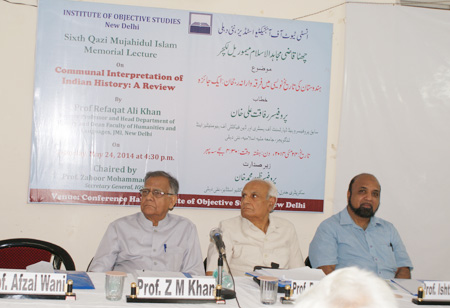
L-R: Prof. Z.M. Khan, Secretary General, IOS; Prof. Refaqat Ali Khan, Vice-Chairman, IOS; Prof. Ishtiyaque Danish, Finance Secretary, IOS
Communal interpretation works both ways. It is both a product and the generator of communalism. Unity of thought among Hindu and Muslim communal historians along with the British imperialist school did not end up with the creation of Pakistan, they still practise communal historiography.
These observations were made by Prof. Refaqat Ali Khan, former Professor and Head of the Department of History and Dean, Faculty of Humanities and Languages, Jamia Millia Islamia, New Delhi and currently the Vice-Chairman of the Institute of Objective Studies (IOS) while delivering the Sixth Qazi Mujahidul Islam Memorial Lecture on “Communal Interpretation of Indian History: A Review”, organised by the IOS at the Conference Hall here on May 24, 2014. He sought to explain that communal historians used history in several ways with one central theme that the Hindus and Muslims could not and did not live together in peace under one judicial, political and social system. Choice of words was different but both the Hindu and Muslim communalists spoke the same language also and some Europeans, whom many of us called imperialist school, were not different, he said. He pointed out that communal historians had a hostile attitude towards Indian National Congress. Some Muslim leaders thought that the Congress was bent upon setting up caste Hindu Raj in India and wanted even during the British rule, to dominate Muslims. The Hindu communal leaders also projected an anti-Hindu image of the Congress.
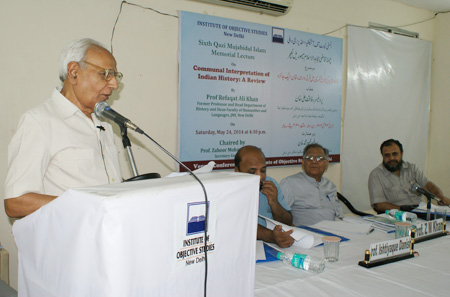
Prof. Refaqat Ali Khan, delivers his speech
Prof. Khan argued that the history of a divided people was a product of divide and rule policy of the British Government, which still continued among historians as a hangover. He divided the historians of the Indian sub-continent into four groups:
1. western/imperialist, 2. Muslim communal historians, 3. Hindu communal historians; and 4. nationalist historians. He held that there was now a fifth group of new historians who did not regard a religious community as a monolithic unit without internal tensions. Their community consideration was based on occupations/profession and not on religion. He said that the impact of communal historiography was so complete that the nationalist leaders, including mass leader like Gandhiji, recognised the presence of separate communities also in historical times and stressed the need for unity among them as they had done in medieval times. Nationalist historians projected Akbar’s “Sulh-e-kul’ while the communalist Hindus and Muslims chose Aurangzeb to project their point of view. He maintained that the Britishers through their historians, like Elliot, wanted the Hindus to feel that the white men had liberated them from the “cruel, burdensome and agonising slavery”, which was inflicted upon them by the barbarian and savage the Muslims. The nationalist and the Marxist scholars had extensively quoted from Elliot’s Preface to establish that communal historiography was planned by the British, fertilised by the communalist writers and harvested by the economic interests at the cost of the poor people of both the communities.
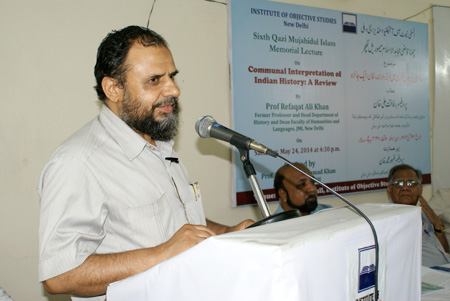
Prof. Afzal Wani, Assistant Secretary General of IOS delivers his views
Referring to several myths in Indian history propounded and cherished by the communal historians, he said that the Hindu communal and the nationalist historians drew great inspiration equally from the greatness of India’s ancient past with one difference, the communalists were inspired by the ancient period and the Hindu kings and chieftains of medieval period like Rana Pratap and Shivaji whereas the nationalists were as much proud of Akbar as they were of Ashoka. Commenting on some characteristic features of the Hindu communal historiography, he said that they claimed the ancient period of Indian history was most glorious. Even the negative elements were either praised or ignored. Like an arithmetical formula, they had made Indian culture equal to ancient culture and the latter to the Gupta culture which was the “golden age” of Indian history. The medieval period was said to be full of political and religious persecutions whereas there was total tolerance and peace in ancient times.
Prof. Refaqat Ali Khan said that GD Birla, founder of the great Birla industrial and commercial empire, through his rich ‘charitable’ Krishanpan Trust with the blessings of the then central minister, KM Munshi and the intellectual participation of the deadly communal historian, RC Mazumdar, assisted the publication of several volumes, called “History and Culture of Indian People” which was popularly known as Vidya Bhavan series. It was a typical model of communal historiography. He opined that pre-independence communal historiography was half-baked history, but the post-independence historiography, including the secular one, was fully mature and evenly baked.
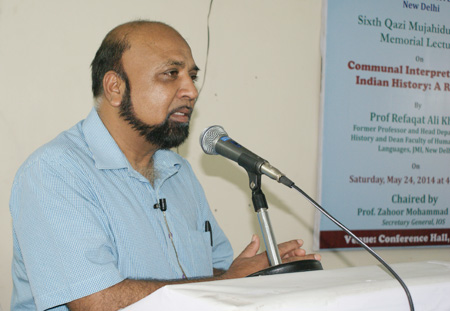
Prof. Ishtiyaque Danish, Finance Secretary, IOS welcomes the audience
Examples of persecution and intolerance were exceptions rather than a rule in a largely rural society and toleration was universal except in circumstances when the source of livelihood of a group, caste or class got tolerance in ancient and intolerance in medieval India was communal historiography. We had been the victims of this kind of historiography. Tolerance was the point of Ashoka’s state policy which he followed almost till the end of his life. However, towards the end of his reign, he pursued a pro-Buddhist policy to the extent that Ajivikas and Jains who hitherto enjoyed patronage and freedom were harassed. Finally, Ashoka started suppressing dissenting Buddhist monks and nuns by withdrawing state support and expelling them from Sangha. Narendra Gupta, one of the last kings of Gupta dynasty raided Magadh and cut down the much respected Bodhi tree at Gaya and wrecked Buddhist foundations wherever he could.
Referring to the communal bias of the eminent historian Jadunath Sarkar against Aurangzeb, Prof. Khan said that he wrote about his demolition of temples in the books while his reference to Kailash temple at Ellora found a place only in a footnote. When Hindu and Muslim rulers needed money they plundered the temples because they had immense wealth. Mosques, on the other hand, had nothing except the brick or stone walls and thus a mosque never attracted the attention of invaders except when it housed the enemies. He remarked that “intolerance, oppression, devastation are cruelty” of Muslim monarchs, especially their “intolerance and violence” towards “their Hindu subjects” were so extremely and passionately propagated that the RSS chief, Madhavrao Sedashiv Golwalkar had no hesitation in calling the whole Muslim community, including the artisans, workers and peasants as “murdering hordes,” “murderous bands”, “despoilers” “free booters”, “the enemy”, “the force of destruction” “old invaders and foes”, “our old and bitter enemies”.
He lamented that prestigious publishing houses were also bringing out communal histories, not because they had joined any active Muslim gang, but to make money. Unfortunately, there was a large market for anti-Muslim and anti-Islamic literature. One such book was Laine’s Shivaji: Hindu King in Islamic India published by the Oxford University Press. The very title of the book smelt foul. The author of the book chose Hindu Marathi authors to project his mission to demonstrate Hindu prejudices and hatred against Muslims and Islam.
Prof. Refaqat Ali Khan laid stress on a positive interpretation of history to project positive role of Indian Muslims in the country’s history. The fact of history was India’s deep-rooted belief in unity in diversity, the backbone of Indian civilisation. This was on account of the strength of all communities, including Hindus and Muslims. Hindus and Muslims had been living together in spite of conflicts for several centuries, he said. He likened the noted writer Nirad C. Chaudhari’s comment in his book, Autobiography of an Unknown Indian, that it was from the end of 1906 that we became conscious of a new kind of hatred for Muslims to Rabindra Nath Tagore’s observation in his Bengali novel Ghare Baire (Home and Outside). He noted that the distortion of history by communal historians of any kind, including the scholars of the West, was a challenge to objective and positive understanding of history. He concluded by saying that communal history generated communalism and communalism encouraged communal history. Both provided sustenance to each other.
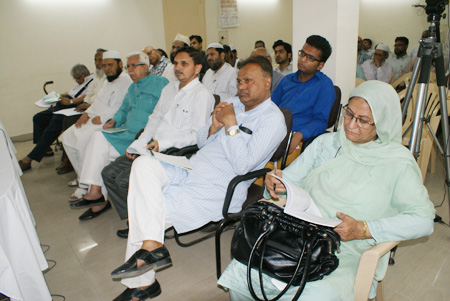
A view of audience
Earlier, the function began with the recitation of a Quranic verse by Maulana Abdullah Tarique. Prof. Ishtiyaque Danish, Professor and Head of the Department of Islamic Studies, Jamia Hamdard and Finance Secretary, IOS, in his welcome address referred to the contribution of Qazi Mujahidul Islam to the Islamic jurisprudence. His decrees on the issues referred to the Darul Qaza were always hailed as they reflected his erudition and clarity of opinion. His association with the IOS was marked by his keen interest in its activities.
Assistant Secretary General of IOS and Professor of Law, Guru Gobind Singh Indrasprastha University, New Delhi, Prof. Afzal Wani, in his address remarked that the IOS gave academics and students a space to interact and arrive at positive conclusions. In his presidential remarks, the Secretary General of the IOS, Prof. Z M Khan, said that the Indian society was very accommodative to whoever came to the country. Its resilience could be gauged from the fact that even those who did not make any significant contribution to society were welcome. Citing an example how a divide between the West and India existed in various symbols, he said that while the West regarded nature as enemy, India treated it as mother. Advising Muslims not to get frightened by what had happened in the country, he asked them to individually and collectively occupy the space provided by the sufis and saints, and the Indian Constitution.
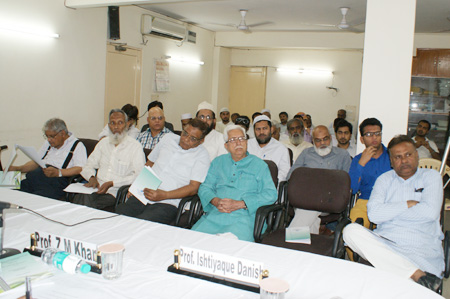
An other view of audience
He quoted a Western scholar who believed that Muslims had not made any significant contribution to any field in the past 200 years. The scholar was of the view that Muslims had stopped thinking and giving new thoughts. He said that history was part of Islam as was geography, shipping, agriculture, etc. He called for use of planning and new techniques to keep abreast of times, or else results would be disastrous. Taking a leaf from history, he said that the role of the ulema of Deoband in the freedom struggle was second to none. He informed that a series of lectures akin to this would be organised by the IOS in future.
While Dr. Nakhat Hussain Nadwi conducted the proceedings, Dr. Tabish Mehdi proposed a vote of thanks. A good number of teachers, including Prof. Haseena Hashia, Dr. Eqbal Husain, and Khurshid Alam from Jamia Millia Islamia, Muzaffar Husain Ghazali, General Secretary, Pasmanda Samaj Sanghatan, Safdar Ali and Syed P Haider from Islamic Fiqh Academy, Safi Akhtar and Waseem Ahmad Fahmi from All India Milli Council, social activists and prominent citizens were present on the occasion. Full Lecture Milli Gazette Report
Go Back